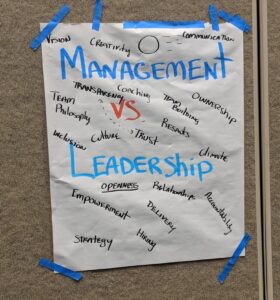 Delegation is an essential practice for managers. In any organization, one of the vital functions of management is to distribute and coordinate work among the group. However, delegating well requires understanding what delegation is and isn’t. Here are three common delegation myths that effective managers don’t fall prey to.
Delegation is an essential practice for managers. In any organization, one of the vital functions of management is to distribute and coordinate work among the group. However, delegating well requires understanding what delegation is and isn’t. Here are three common delegation myths that effective managers don’t fall prey to.
Management
Addressing Complaints, Part 3: Saying No to Requests
 Telling someone something they don’t want to hear is never fun. When someone points out a problem causing them real pain, you likely want to do something about it – particularly if you’re their manager. Saying no to when someone asks you to fix something is often a necessary part of a manager’s job.
Telling someone something they don’t want to hear is never fun. When someone points out a problem causing them real pain, you likely want to do something about it – particularly if you’re their manager. Saying no to when someone asks you to fix something is often a necessary part of a manager’s job.
Addressing Complaints, Part 2: The Limits of Authority
 Addressing complaints is essential to a manager’s job but can quickly become overwhelming. Part One of this series shared a technique for sorting through people’s concerns. It also showed how to use your authority effectively to address some of them. But people often complain about things outside your control – and you need to deal with those as well.
Addressing complaints is essential to a manager’s job but can quickly become overwhelming. Part One of this series shared a technique for sorting through people’s concerns. It also showed how to use your authority effectively to address some of them. But people often complain about things outside your control – and you need to deal with those as well.
Addressing Complaints, Part 1: Taking Action
 Addressing complaints is an essential part of a manager’s job. By keeping their finger on the pulse of what’s bothering people, managers can act as an early warning system for higher levels of management. By addressing their people’s concerns, managers can improve both productivity and morale. At the same time, facing an endless stream of criticism – often about things you can’t control – can be one of the most frustrating parts of being a manager. As a manager, you need the ability to listen to and learn from complaints without drowning in them.
Addressing complaints is an essential part of a manager’s job. By keeping their finger on the pulse of what’s bothering people, managers can act as an early warning system for higher levels of management. By addressing their people’s concerns, managers can improve both productivity and morale. At the same time, facing an endless stream of criticism – often about things you can’t control – can be one of the most frustrating parts of being a manager. As a manager, you need the ability to listen to and learn from complaints without drowning in them.
Asking for Clarity from Your Boss
 Working with other people is hard – for a variety of reasons. One of the promises of working together is that you can help each other to get things done. One of the biggest obstacles to doing this is not sharing a brain. Asking for clarity helps you avoid the trap of only thinking you know what someone wants. But all too often, when someone asks you for help or wants to delegate something to you, you can find yourself playing “Bring Me a Rock.”
Working with other people is hard – for a variety of reasons. One of the promises of working together is that you can help each other to get things done. One of the biggest obstacles to doing this is not sharing a brain. Asking for clarity helps you avoid the trap of only thinking you know what someone wants. But all too often, when someone asks you for help or wants to delegate something to you, you can find yourself playing “Bring Me a Rock.”
Helping Managers Manage (and Not Just “Lead”)
 “I want to be a people manager, but I don’t want to manage people.”
“I want to be a people manager, but I don’t want to manage people.”
We’ve never worked with anyone who has said this quite this clearly. Still, some managers we’ve worked with have been ambivalent about the work of management. They have been reluctant to use the authority that comes along with their role. This attitude is understandable, given how little emphasis we’ve seen in organizations on helping managers use it productively and humanely. It’s also problematic. When managers don’t fully inhabit their role, they struggle (and often fail) to set clear expectations, to give productive feedback, to communicate and sponsor effective change, and to support their managers.
Managing Up is about Partnership
 For a long time, “managing up” rubbed me the wrong way. The way that people frequently used the phrase brought to mind judgment, manipulation, and deception. It seemed rooted in a belief that your manager didn’t understand how work got done. Just as I thought “stakeholder management” involved carefully controlling your messaging to always make yourself look good, I believed that managing up was fundamentally unethical.
For a long time, “managing up” rubbed me the wrong way. The way that people frequently used the phrase brought to mind judgment, manipulation, and deception. It seemed rooted in a belief that your manager didn’t understand how work got done. Just as I thought “stakeholder management” involved carefully controlling your messaging to always make yourself look good, I believed that managing up was fundamentally unethical.
I was wrong. Managing up is about partnership.
Unpacking Your Manager Role
 Saying someone is a manager tells you little about what they do or where they spend their time. Different companies lay out these duties differently; managers within the same company (or department) sometimes have vastly different jobs. As a manager, having mismatched expectations about your role – particularly with your boss and peers – can have unfortunate results.
Saying someone is a manager tells you little about what they do or where they spend their time. Different companies lay out these duties differently; managers within the same company (or department) sometimes have vastly different jobs. As a manager, having mismatched expectations about your role – particularly with your boss and peers – can have unfortunate results.
Performance Feedback Requires Clear Expectations

“One of the people I manage is underperforming. I need to give them feedback about how they aren’t meeting expectations.”
I hear this often from managers, and I get curious whenever I do. The instinct behind it is good: Managers need to address underperformance. In my experience, however, giving performance feedback about unmet expectations is unlikely to help if you haven’t done your homework first. One of my teachers says, “80% of employee problems are due to manager neglect.” Whether you are a manager or not, when someone isn’t meeting your expectations, start by looking at what you’re doing – and what you’re not.
Navigating Team Conflict with the Waterline Model
 Conflict is a challenging topic for many people to navigate. It’s a natural part of working together in groups, yet in the midst of it, it can feel terribly dysfunctional. There’s no shortage of ideas about how to work through it, and there are lots of tools available. The choice of what tool to use when can feel overwhelming. How do you know where to get started? One of my to-go methods for engaging with conflict is the Waterline Model.
Conflict is a challenging topic for many people to navigate. It’s a natural part of working together in groups, yet in the midst of it, it can feel terribly dysfunctional. There’s no shortage of ideas about how to work through it, and there are lots of tools available. The choice of what tool to use when can feel overwhelming. How do you know where to get started? One of my to-go methods for engaging with conflict is the Waterline Model.










